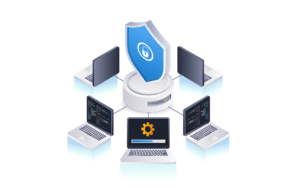In this threatful era where you have to watch your every step, keeping your data safe is not just a choice. It has become a must. Most businesses are online now. They send, store and receive all kinds of important information through the Internet. This makes them an easy target for hackers and harmful software. That’s why you need something strong to protect your business.
That’s where network firewalls become a necessity since these are smart tools that stop bad traffic from getting in and help you keep control of your system. With the right network firewall solutions, you could keep your data safe, your work smooth and your business running without problems.
What Are Network Firewalls?

A network firewall works like a gate between your system and the internet. It watches every piece of data that goes in or out. If anything looks strange or risky, the firewall blocks it. This keeps your private information safe from people who should not see it.
Network firewall solutions are made to help you avoid problems like hacks, viruses and data leaks. They look at where the data is coming from and where it is going. If something doesn’t match the safety rules, it gets blocked. These firewalls help you stay in charge of your online work without being scared of attacks.
Why Do You Need Network Firewalls?
Without a network firewall, your system is open to anyone. It’s like leaving your front door wide open. Hackers could steal your files. Viruses could damage your system. You might even lose important data. That’s why network firewall solutions are so helpful. They act like guards who stop anything harmful from coming in.
They could help you:
- Stop people from getting into your system without your permission.
- Avoid slowdowns or crashes caused by harmful software.
- Keep customer data safe.
- Keep your business from losing money due to security problems.
How Do Network Firewalls Work?
Let’s break it down in a simple way. When you send or get something online, it moves in small chunks called packets. A network firewall checks each of these packets. If the packet follows your safety rules, it gets through. If it doesn’t, the firewall blocks it.
Some firewalls are simple and only check basic details. Others look deeper into the packet. These are called advanced firewalls. Some even have extra tools that can watch for newer types of threats. So network firewall solutions can be simple or more complete depending on what your business needs.
Different Types of Network Firewalls

You’ll find a few main kinds of network firewalls and each one has a job:
- Packet Filtering Firewalls – These are basic firewalls. They look at each packet and follow simple rules to block or let it in.
- Stateful Inspection Firewalls – These firewalls remember past data. They check new packets based on what has already been allowed.
- Proxy Firewalls – These firewalls act as go betweens. They take in the data first and then send it to your system only if it’s safe.
- Next Generation Firewalls – These are the smarter ones. They look deeper into the data and can spot modern threats faster.
Advantages of Network Firewalls
Using network firewalls has many upsides. They don’t just protect your system as they help it work better too.
Here’s how:
- Speed and Data Flow – Firewalls can help your system move data without delays. They block junk traffic that slows you down.
- Quick Setup – Most network firewall solutions can be added to your current system easily. They don’t take long to set up.
- Blocks Outside Attacks – They stop people who try to break into your system from the outside.
- Stops Malware – They stop harmful software before it spreads into your files.
- Keeps Traffic in Line – They help manage the flow of data so your internet stays stable.
- Cloud Safety – Many businesses store files online now. Firewalls help protect those too.
Disadvantages of Network Firewalls
Like everything, network firewalls have a few downsides too. It’s good to know them before you set one up.
- Setup Cost – Some strong network firewall solutions cost more at the start. This can be tough for smaller companies.
- Hard to Set Up Right – If the rules are not set correctly, they might miss a threat or block good traffic.
- Speed May Drop – If the firewall is doing too much, it could slow your internet a little.
Still, with the right help, these problems are small and can be fixed.
Best Practices for Firewall Security
To get the best out of your network firewalls, you should follow a few simple steps:
- Set Up Rules Carefully – Make sure the firewall rules match how your business works.
- Use More Than One Type – Use a mix of firewalls if your system needs more safety.
- Keep Data Backups – Save copies of your data often in case something goes wrong.
- Check Logs Often – Firewalls keep a list of all traffic. Looking at it often can help you spot strange activity.
Network Firewall Solutions by Oxiore
At Oxiore, we know how important it is to keep your data safe. That’s why our network firewall solutions are made to match your system and your goals.
Firewall Protection
- Stops harmful files and hackers from getting into your system
- Keeps traffic steady and improves how your network runs
Easy Setup
- Fast to install
- Fits into your system without needing big changes
Full Support
- Gives alerts when something strange happens
- We keep checking your system to make sure it’s working well
Key Features of Our Firewalls
Our network firewall solutions include:
- Security from Hackers – Blocks unwanted users
- Real Time Alerts – Spots trouble as it happens
- Safe Remote Access – You can work from anywhere safely
- Web Filtering – Blocks unsafe websites and apps
FAQs
1. Can a firewall stop every cyber threat?
No firewall is perfect but when you use network firewalls with other tools like virus scanners and safety checks, your system can stay much safer.
2. Will a firewall slow down my internet?
If the setup is simple and not too strict then no but if you use too many filters or rules, it might slow down a bit. That’s why good network firewall solutions always need to be set up the right way.
3. Do I still need antivirus if I have a firewall?
Yes because a firewall and antivirus do different things. Firewalls stop bad traffic from reaching you. Antivirus catches harmful files that somehow get through. You need both to stay fully safe.
4. Can I use one firewall for my whole business?
Yes, in many cases you can but if your business has many branches or remote teams, you might need more than one. Good network firewall solutions can grow with your business.
If you want to protect your data, keep your work steady and stop worrying about online threats then now is the time. Oxiore’s network firewall solutions are made to help your business stay safe and fast at the same time. Talk to our team today and find out how our network firewalls can keep your system strong and free of all stress.


